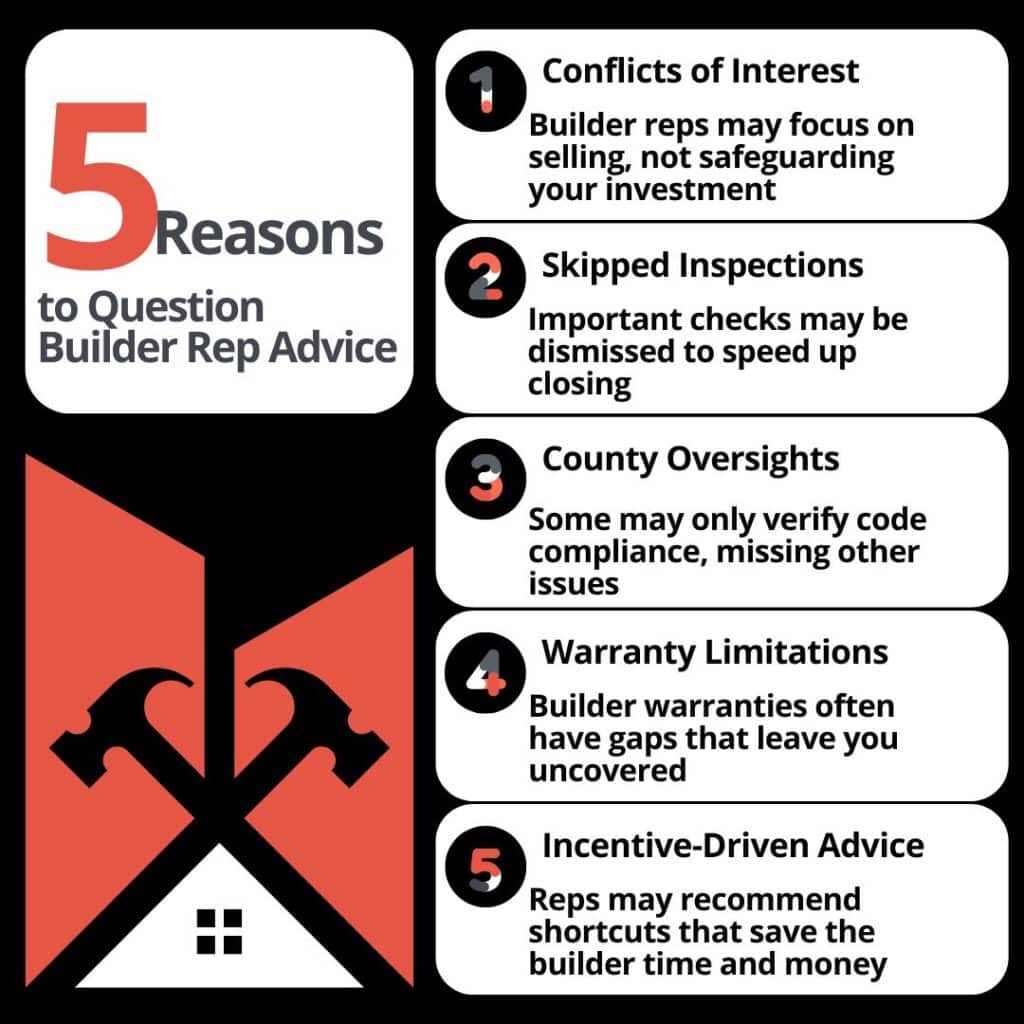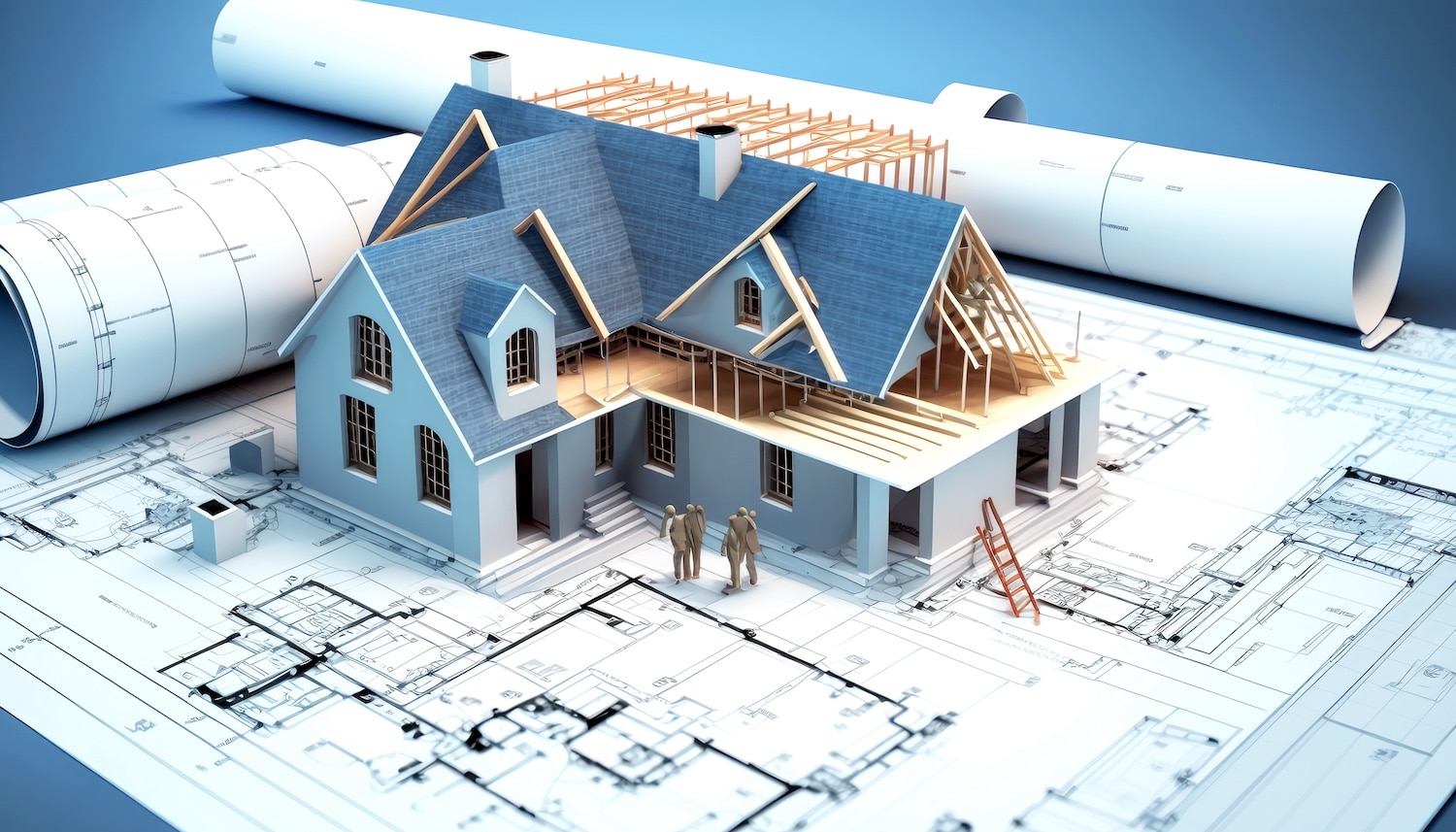Buying a newly built home is exciting! Everything feels fresh and untouched, but don’t let that new home smell fool you – even a brand-new house can hide issues that go unnoticed until inspection day. Builder representatives often highlight the home’s features and insist everything is up to code, but their priority is closing the deal, not protecting your investment. This is one reason a new construction home inspection is still important despite builder rep guidance – now, let’s explore the others.
Table of Contents
ToggleConflicts of Interest
Builder representatives aim to finalize deals quickly. While they might seem to be on your side, their priority is ultimately to sell the home and meet their sales targets.
This can create a conflict of interest, where their advice may favor the builder’s goals rather than yours. According to a study by the National Association of Home Builders (NAHB), sales representatives are often incentivized based on the number of homes they sell, which means their focus may not align with the buyer’s best interests.
An independent inspector, however, works for you. Unlike builder reps, they have no ties to the construction company, which means their assessment is unbiased and tells it how it is.

Skipped Inspections
Builder reps might suggest that a dedicated inspection is unnecessary, claiming that everything has already been reviewed and approved – which can be misleading.
Even though a home may appear complete, there can be underlying issues like poor insulation, electrical problems, or plumbing defects that aren’t visible to the untrained eye. The American Society of Home Inspectors (ASHI) states that up to 15% of newly built homes have significant defects that go unnoticed until an independent inspection.
A new construction home inspection offers the detailed, professional evaluation needed to catch these hidden issues. That way, you know your new home meets all quality and safety standards before moving in.
County Inspector Oversights
It’s common to assume that county inspections are sufficient for ensuring home quality. However, county inspectors typically focus on ensuring that the property meets the minimum code requirements.
These inspections often overlook cosmetic or functional issues that don’t fall under their jurisdiction. According to a report from the International Code Council (ICC), nearly 25% of issues found in new homes involve elements that county inspectors are not required to check, like structural imperfections or HVAC system problems.
A professional new construction home inspection goes beyond the basics. It covers all aspects of the home’s quality, from structural integrity to functional elements and cosmetic details.
Warranty Limitations
Builder warranties often seem like a safety net, but they can come with limitations that are not always obvious.
These warranties might only cover certain defects for a limited time or exclude items like cosmetic issues and minor damages. Structural issues, for example, might be covered for a longer duration. However, smaller problems like flooring defects or minor roof leaks could fall outside the warranty’s scope.
Builder reps may not always explain these limitations clearly, leaving you with unexpected out-of-pocket repair costs after the warranty expires. No shortage of homeowners have experienced dissatisfaction with builder warranties due to vague terms and limited coverage.
An in-depth inspection of the home before the warranty period ends will help identify issues that should be addressed while the builder is still responsible.
Incentive-Driven Advice
Finally, builder representatives often work under compensation structures where bonuses and incentives are linked to their sales. This arrangement can influence their recommendations, leading them to suggest shortcuts that benefit the builder rather than the buyer.
For example, a rep might rush you into closing the sale quickly. They could imply that additional inspections are unnecessary or would delay your move-in date. They may also recommend cheaper, quicker fixes during the construction process to keep costs low for the builder, even if these solutions might lead to issues later on.
Homebuyers need to be aware of these dynamics to protect their investment. If a representative downplays the value of a thorough inspection or seems eager to close the deal without addressing your concerns, it’s a red flag.
A Note on Builder Representatives
All of this being true, it’s still important to remember that builder representatives play a valuable role in the overall process. They work hard to present homes in the best light and facilitate a smooth purchasing experience.
While their focus is on completing sales and meeting builder targets, this doesn’t mean they’re acting in bad faith. They aim to balance the builder’s goals with the buyer’s needs as best as possible. However, to ensure your investment is fully protected, supplementing their efforts with an independent inspection is your best move.

Recommended Maintenance for New Homes
Even in your new construction home, ongoing maintenance is necessary. Regular care helps identify minor issues and keep your home good as new!
Key Areas
- Water Damage: Check around windows, doors, and plumbing fixtures for leaks or moisture buildup. Catching these signs early prevents structural damage and mold growth.
- HVAC Systems: Schedule routine inspections for your heating and cooling systems. Proper maintenance ensures efficiency, reduces the risk of breakdowns, and keeps energy costs manageable.
- Roof and Foundation: Inspect the roof for missing shingles or signs of wear. Look for any cracks or movement in the foundation. Addressing these early helps avoid costly repairs.
When to Call a Professional
Timing your inspections helps get the most out of them and ensures any issues are addressed while they’re still manageable. Key stages for calling a professional include:
- Before drywall installation: So the inspector can assess the foundation, framing, electrical wiring, plumbing, and insulation before they’re covered up.
- After major construction milestones: Following key phases, like framing and roof installation. This ensures that structural elements are up to standard before the next steps.
- Before the final walkthrough: This is your last chance to have a professional inspect the home while the builder is still responsible for fixing any defects.
Conclusion
Relying solely on builder representatives throughout the construction and purchasing process of your new home can lead to overlooked issues. A professional, unbiased inspection offers a comprehensive evaluation,. That way, your investment is protected and your home meets the highest standards of quality and safety.
If you’re planning to purchase a new construction home or need to schedule an inspection for your current home in central Florida, call Tier-1 Pro Inspections.

